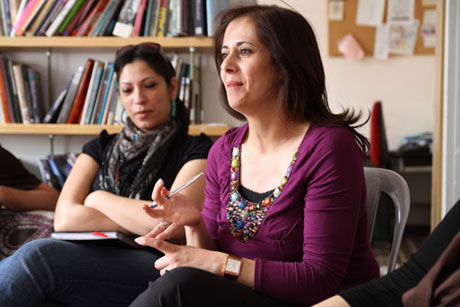Rula Salameh --
"They don't treat us as humans"
By J.David

(Photo Credit: Kim Daniels)
JERUSALEM -- By most people’s standards, Rula Salameh enjoyed a charmed life. She was married to a successful businessman, lived in a palace in Dubai, had everything she ever needed, and the money to buy whatever she wanted.
“The only decision I had to make was what to buy,” Salameh says with a laugh. “I had nothing to do but go shopping.”
Salameh’s life, before meeting her husband, didn’t compared to the experiences of the everyday Palestinians she covered while working as a journalist and filmmaker during the First Intifada. Back then, assignments in the West Bank had her reporting on the pressing issues of life under the occupation. But when she went home to Jerusalem, where her family lived for decades, she faced similarly debilitating struggles as an Arab citizen of Jerusalem.
Although her marriage seemed to offer an alternate existence, Salameh's subsequent story belies a happy ever after ending. She tells the tale to a group of journalists gathered in a meeting room at Bat Shalom, a feminist center committed to working with Israeli and Palestinian women.
When she became pregnant, Salameh strategized his seems a little cold could you say decided? to deliver the child in Jerusalem so he could enjoy the benefits of Israeli citizenship. That meant she needed to leave her husband in Dubai and return to her family home until her son was born.
“According to Israeli law,” she explains, “Palestinians living in East Jerusalem must deliver their babies in Israel for the children to get Israeli identification papers.”
The benefits granted to Arab citizens with Israeli identification numbers may fall short of those given to Israeli Jewish citizens, but they do exceed the rights granted to Palestinians living in the West Bank and Gaza.
Arab Israeli citizens, for example, are entitled to semi-permanent legal resident status, greater mobility within Israel (excluding the West Bank and Gaza), the right to vote, quality health care and better educational opportunities than those extended to non-citizens of the state.
After birthing a healthy baby boy in an Israeli hospital, Salameh turned to the Ministry of the Interior to request her son’s birth certificate. Instead of granting this request, the government office sent a letter outlining the conditions under which Salameh could take her son out of Israel to visit his Palestinian-born father. The response was not encouraging.
“They said I could come and go freely before my son turns five,” Salameh explains. “But after that, my son can’t leave the country or he won’t be allowed to return.”
Salameh reluctantly cancelled a trip to see her husband out of fear of getting locked out of the country and losing citizenship for her son. Her husband made multiple attempts to obtain a temporary visa from the Israeli Embassy in Jordan – to no avail.
His persistent requests eventually earned a response from the Ministry of Interior that detailed two ways Salameh could proceed.
“They said I could sign a document saying I don’t want an Israeli identification number for my son,” Salameh says while shaking her head. “And if he ever needs to return to Israel, he could simply get a visa from the Embassy in Jordan.”
Since the office that repeatedly denied her husband’s requests would then oversee approving her son’s visa in Jordan, she decided this was not a viable option.
“The other option suggested to me was to get a divorce,” she says.
After two years, three lawyers and a depleted bank account, Salameh decided this last option was not an option, but an imperative. She had to move forward with the divorce to protect her son’s best interests.
“We couldn’t move throughout Israel without an official document saying that he is mine,” Salameh explains. “So he needed that Israeli ID card.”
After finalizing the divorce, Salameh picked up her son’s temporary identification card. But the birth certificate, along with the rights and privileges that accompany it, was nowhere to be found.
Salameh’s son was eventually denied enrollment in an East Jerusalem private school because he had no Israeli ID number. A frustrated Salameh pulled out all the stops and requested a favor from an unlikely source. Salameh asked Yasser Arafat, then President of the Palestinian National Authority, to write a “strongly worded” letter on behalf of her son to Israeli authorities and school officials demanding her boy’s admittance into school.
Shortly after, the boy was allowed to attend an Israeli private school.
Salameh continued to fight for her son's birth certificate, the proof of his Israeli citizenship, but she never received it. When the boy turned 12, the age when Israeli children are given permanent identification numbers, Salameh went to the Ministry of the Interior to pick up his card.
“My son’s ID said his nationality was ‘undefined,’” Salameh says with wide eyes. “Not Palestinian, Jordanian or even Israeli. It was ‘undefined.’ And it was still temporary.”
Salameh continues to fight for her son’s birth certificate. But after 12 years, she only has received a temporary identification card and a letter stating that her son was born in an Israeli hospital.
“We want our sons and daughters to make peace with the Israelis,” Salameh says while shaking her head. “But how can we reinforce this into their minds if the Israelis can’t even treat us as humans?”
